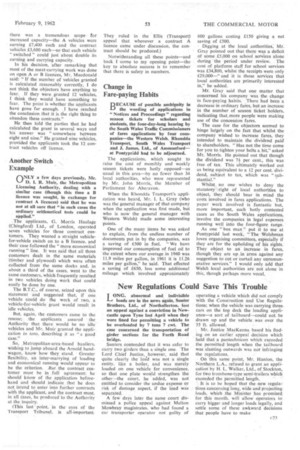Another Switch Example
Page 55

If you've noticed an error in this article please click here to report it so we can fix it.
QNLY a few days previously, Mr. D. I. R. Muir, the Metropolitan Licensing Authority, dealing with a similar case (though this time a B licence was sought, in exchange for contract A licences) said that he was not at all sure that "in such cases the ordinary arithmetical tests could be applied."
The applicants, G. Morris Haulage (Chingford) Ltd., of London, operated seven vehicles for three contract customers. They wanted a straight vehiclefor-vehicle switch on to a B licence, and their case followed the " more economical running" line. It was said that all three customers dealt in the same materials (timber and plywood) which were often collected from the same docks and, in about a third of the cases, went to the same customers, which frequently resulted in two vehicles doing work that could easily be done by one.
The B.T.C., of course, seized upon this statement and suggested that, if one vehicle could do the work of two, a vehicle-for-vehicle grant would result in idle vehicles.
But, again, the customers came to the rescue; the applicants assured the Authority that there would be no idle vehicles and Mr. Muir granted the application in toto, describing it as "a good case."
So, Metropolitan-area-based hauliers. wishing to jump aboard the Arnold bandwagon, know how they stand. Greater flexibility, an inter-marrying of loading and economical running would appear to be the criterion. But the contract customer must be in full agreement: he should know of the application beforehand and should indicate that he does not intend to enter into further contracts with the applicant, and the contract must. in all cases, be produced to the Authority at the inquiry.
(This last point, in the eyes of the Transport Tribunal, is all-important. They ruled in the Ellis (Transport) appeal that whenever a contract A licence came under discussion, the contract should be produced.) Notwithstanding all these points—and back I come to my opening point—the key to absolute success is to remember that there is safety in numbers.
















































































































